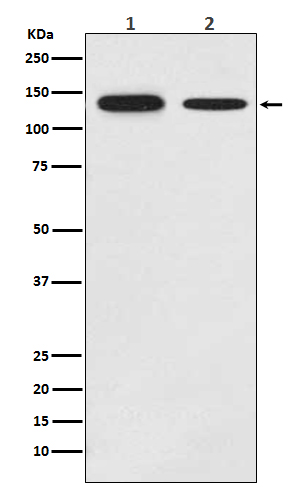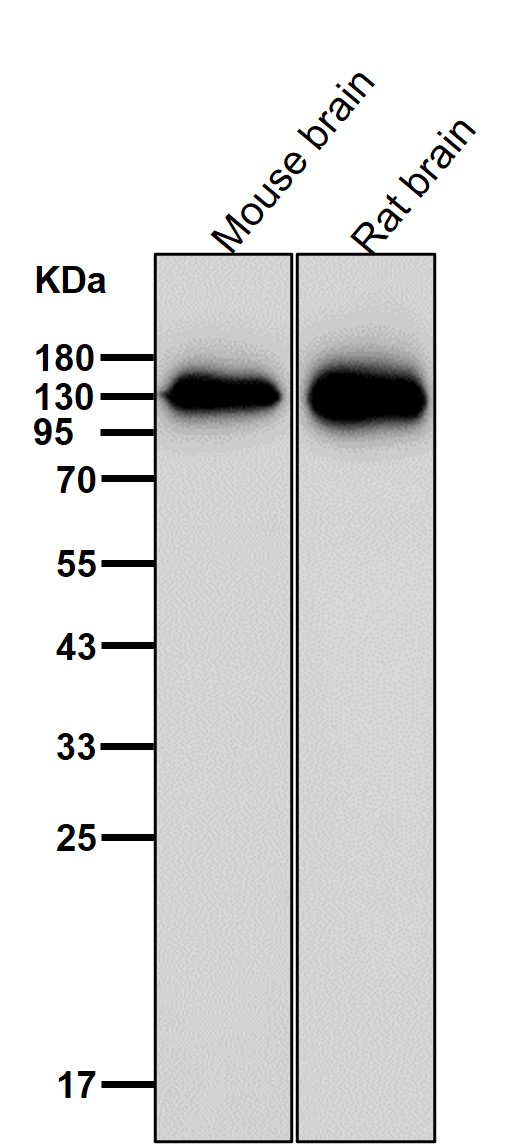

| WB | 咨询技术 | Human,Mouse,Rat |
| IF | 咨询技术 | Human,Mouse,Rat |
| IHC | 咨询技术 | Human,Mouse,Rat |
| ICC | 1/50-1/200 | Human,Mouse,Rat |
| FCM | 1/20-1/100 | Human,Mouse,Rat |
| Elisa | 咨询技术 | Human,Mouse,Rat |
| Aliases | GH-binding protein; GHBP; GHR; Serum binding protein; Somatotropin receptor;;Growth hormone receptor |
| WB Predicted band size | Calculated MW: 72 kDa ; Observed MW: 140 kDa |
| Host/Isotype | Rabbit IgG |
| Antibody Type | Primary antibody |
| Storage | Store at 4°C short term. Aliquot and store at -20°C long term. Avoid freeze/thaw cycles. |
| Species Reactivity | Human,Mouse,Rat |
| Immunogen | A synthesized peptide derived from human Growth hormone receptor |
| Formulation | Purified antibody in PBS with 0.05% sodium azide,0.05% BSA and 50% glycerol. |
+ +
以下是关于GHR(生长激素受体)抗体的3篇代表性文献摘要,供参考:
---
1. **文献名称**:*Cloning of the human growth hormone receptor and its expression in leukemia and AIDS*
**作者**:Leung, D.W., et al.
**摘要**:该研究首次克隆了人类生长激素受体(GHR)基因,并制备了针对GHR的单克隆抗体,用于检测白血病细胞和艾滋病患者淋巴组织中的受体表达,揭示了GHR在病理状态下的潜在作用。
---
2. **文献名称**:*Growth hormone receptor expression in human breast cancer*
**作者**:Colao, A., et al.
**摘要**:通过免疫组化技术使用特异性GHR抗体,研究发现乳腺癌组织中GHR高表达与肿瘤侵袭性相关,提示GHR可能成为乳腺癌治疗的潜在靶点。
---
3. **文献名称**:*Growth hormone-induced phosphorylation of STAT5 in human lymphocytes: a key mechanism for receptor signaling*
**作者**:Argetsinger, L.S., et al.
**摘要**:利用抗GHR抗体阻断实验,阐明了GHR通过JAK2-STAT5信号通路介导生长激素的细胞内效应,为理解GHR信号传导机制提供了实验依据。
---
**注**:以上文献为示例性总结,实际引用时需核对原文准确性及发表年份。如需更近期研究,建议在PubMed或Web of Science检索关键词“GHR antibody”或“growth hormone receptor antibody”。
The growth hormone receptor (GHR) is a transmembrane protein belonging to the cytokine receptor superfamily, critical for mediating the physiological effects of growth hormone (GH) in growth, metabolism, and cellular regeneration. GHR antibodies are immunoglobulins that specifically target this receptor, either blocking or modulating its activity. These antibodies have garnered attention in both research and clinical settings due to their potential therapeutic and diagnostic applications.
In research, GHR antibodies are widely used to study GH signaling pathways, receptor distribution, and their roles in development and disease. Clinically, they hold promise in conditions linked to GH dysregulation. For instance, antagonistic GHR antibodies (e.g., pegvisomant) are FDA-approved to treat acromegaly by blocking GH binding, thereby reducing insulin-like growth factor 1 (IGF-1) production. Conversely, agonistic antibodies that mimic GH action are explored for growth disorders or metabolic syndromes.
Aberrant GHR expression is also implicated in cancers and insulin resistance, spurring interest in antibodies as targeted therapies. However, challenges remain, including optimizing specificity to avoid off-target effects and understanding long-term impacts of receptor modulation. Additionally, autoantibodies against GHR are observed in rare disorders like Laron syndrome, highlighting their pathophysiological relevance. Overall, GHR antibodies represent versatile tools bridging mechanistic studies and therapeutic innovation in endocrinology and beyond.
×